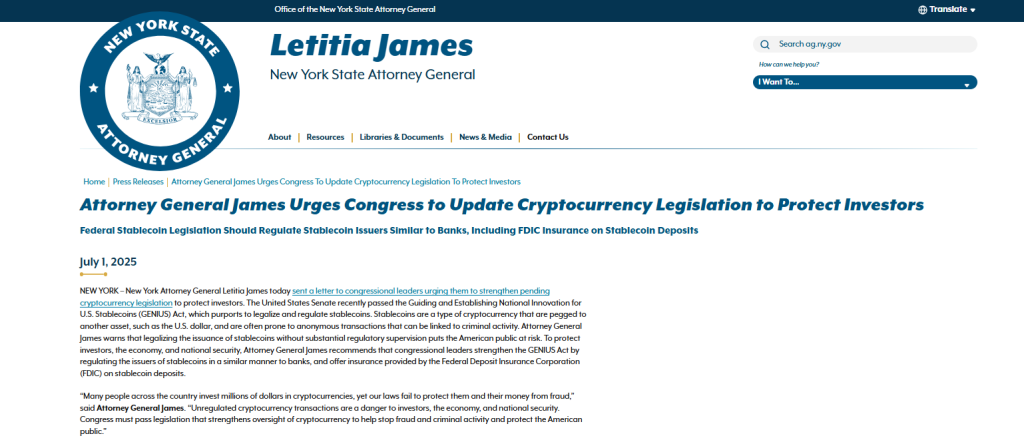Concerns Surge Over the GENIUS Act: Attorney General’s Cautionary Stance
The financial landscape in the U.S. is abuzz with tension as New York Attorney General Letitia James raises the alarm over the recently passed GENIUS Act. In a letter addressed to congressional leaders, James voices her profound concerns that this legislation, if left unchanged, could jeopardize both investors and the broader economic structure. The urgency of her message underscores the necessity for a cautious approach in the realm of digital currencies.
A Groundbreaking Legislative Move—But at What Cost?
In a historic 68-30 vote, the U.S. Senate approved the “Guiding and Establishing National Innovation for U.S. Stablecoins Act” last month, marking a significant milestone in the regulation of stablecoins. This bill seeks to impose strict requirements on stablecoin issuers, including mandates for full dollar backing and monthly reserve disclosures. Now, it’s headed to the House of Representatives, where lawmakers are poised for a potential vote imminently.

*The U.S. Senate’s approval of the GENIUS Act sparks debate over investor protection and regulatory oversight.*
James’ Strong Warning: Protecting Investors and National Security
Attorney General James does not mince words when discussing the potential fallout of the GENIUS Act. She highlights that millions of Americans have invested significant funds in cryptocurrencies, yet the existing laws seemingly do little to shield them from fraud. In her letter, she states unequivocally: “Unregulated cryptocurrency transactions are a danger to investors, the economy, and national security.”
James raises a crucial point: the current version of the GENIUS Act could enable stablecoin issuers to operate with far less accountability than traditional banks. She argues for more robust oversight, advocating that stablecoin entities should be treated on par with banks, which would necessitate enhanced regulatory scrutiny and capital requirements, along with providing FDIC insurance for stablecoin deposits.
Building a Safe Crypto Environment: The Call for Stronger Measures
In her thoughtful critique, James emphasizes the importance of implementing strict protective measures. She proposes digital identity verification for stablecoin users as a means to curb fraud, hinder money laundering, and minimize the risks posed by anonymous transactions—concerns that could potentially serve as tools for criminal networks and terrorist organizations.
Moreover, James is adamant about ensuring that all stablecoin issuers remain under U.S. jurisdiction. She warns of the inherent challenges presented by offshore platforms that can evade stringent regulatory standards, which only complicates enforcement efforts. Additionally, she calls for lawmakers to safeguard the interests of community banks vital for servicing rural and underserved regions in America.
A Broader Look: The GENIUS and CLARITY Acts
Attorney General James is not solely focused on the GENIUS Act; she has also submitted her concerns regarding the Digital Asset Market Clarity Act (CLARITY) to the House Financial Services Committee. The critiques extend beyond the GENIUS Act, targeting its tendency to favor industry growth over necessary consumer protections. She warns that without crucial amendments, both the GENIUS and CLARITY Acts could pave the way for a regulatory environment weak on safeguards against fraud and market manipulation.
Expert Perspectives: Industry Weighs In
Experts in the field have echoed James’ sentiments, urging Congress to take a measured approach to cryptocurrency regulation. They argue that creating a regulatory framework that incorporates both innovation and consumer safety is critical. The balance between fostering a thriving digital asset market and ensuring investor protection is imperative in this rapidly evolving landscape.
The Legislative Path Ahead: What’s Next for Crypto Regulation?
With both the GENIUS and CLARITY Acts slated for procedural votes in the House of Representatives as early as the week of July 7, the stakes are high. If successful, the passage of either bill would revolutionize how digital assets are regulated across the nation.
⚠️ The GENIUS Act has been passed — but experts say stablecoins have the potential to damage the global economy #Crypto #Tether #Circle #USDT #USDC https://t.co/NWGB63iV2M
Presidential Support and Urgent Appeals
Former President Donald Trump has publicly expressed his endorsement of the GENIUS Act, urging swift action to get it to his desk without delays. However, James remains steadfast in her belief that thorough scrutiny is essential to safeguard American investors from potential pitfalls.
As Washington shifts focus towards establishing clear regulations for cryptocurrencies, James emphasizes the importance of a balanced approach that does not compromise investor protection or financial stability for the sake of expediency. “Congress must pass legislation that strengthens oversight of cryptocurrency to help stop fraud and criminal activity and protect the American public,” she insists.
Conclusion: A Call for Engaged Dialogue
As the debate over the GENIUS Act intensifies, the discussions surrounding it reflect broader questions about the future of cryptocurrency regulation in the United States. Stakeholders from all sides are encouraged to engage in this vital conversation. What measures do you believe are essential for protecting investors while allowing innovation to flourish in the digital currency space? Share your thoughts below and join the dialogue on the future of cryptocurrency regulation!
